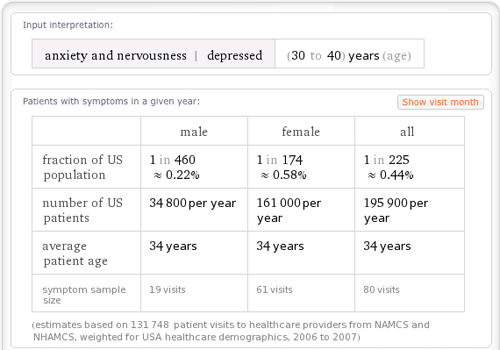Ah, spring! The time of year when winter coats are exchanged for short sleeved shirts, space heaters for open windows, and winter colds for stuffy noses, rashes, and itchy or watery eyes. When suffering from any set of symptoms, misery often seeks company, and what better way to find out how many other people share in your seasonal symptomatology than through Wolfram|Alpha? By aggregating survey data from the Centers for Disease Control and Prevention (CDC), our medical content team has put together a unique set of symptom-searching tools that will enable you to investigate all of the symptoms you may experience throughout the year. For example, by entering “sneeze”, you can immediately find that an estimated 960,000 patients complain of sneezing when they visit the doctor each year, and that marginally more male patients complain of sneezing than female patients.
By scrolling down through the output, we also find that sneezing is highly correlated with the primary diagnosis of allergic rhinitis (otherwise known as hay fever). Just below the diagnosis probabilities data table, we can find information about the drugs associated with diagnoses that are correlated with sneezing. Not surprisingly, allergic rhinitis is strongly associated with the drug Zyrtec. What is interesting is that, between the sexes, males are more often prescribed Nasonex to control their symptoms than females.
Further along down the page, it’s no surprise to find that the symptoms that most commonly co-occur with sneezing are coughing and nasal congestion. By clicking the “Show specific symptoms” button, we can access which group of specific symptoms make up more general symptom categories. For example, cough and nasal congestion have no specific subset of symptoms, but eye discharge is a more general description of symptoms that include the more specific symptom “watery eyes”, and “throat symptoms” includes “soreness of throat”, “swollen throat”, and “throat irritation”.
Below the symptom table, distributions of patient characteristics detail the variability of patients’ attributes. By default, these attributes include age, weight, height, and BMI. By clicking the “More” button in the top right corner of the pod, you can also access systolic blood pressure, diastolic blood pressure, and body temperature distributions. For easy reference, all attribute distributions are laid over a light gray distribution curve that represents the entire US general population.
Within the rest of the output, Wolfram|Alpha also supplies the conditional probabilities for which select sub-populations are affected by a queried symptom, as well as the percentage of patients with the symptom who utilized specific healthcare payment methods. Besides single symptoms, multiple symptoms can also be searched through Wolfram|Alpha. For example, after entering “anxiety and depression”, the data that is returned reflect those patients who reported or were diagnosed with depression and anxiety during a healthcare provider visit in a given year. Data can also be queried by attributes that include age, gender, and weight. For example, users can add an age to the previous example (e.g. “anxiety and depression age 37”) and get a tailored output specific to patients between 30 and 40 years old.
Various new features and additions to our symptom dataset are currently underway, including the addition of more years of survey data, which will add even more searchable symptom combinations. The medical research field is vast and encompasses a large number of professionals ranging from physicians to physicists. At Wolfram|Alpha, we aim to make our medical content available and relevant to all who are interested, and we hope to become your first choice when researching medical information online.
I don’t see information on drugs associated with diagnoses following any symptom (or diagnosis) input (e.g., including individual symptoms of sneezing, headache).
if you do start advertising/recommending for profit diseasecare drugs on here, I certainly hope you do the same for alternative/Pre-WWII treatments.
Let’s hope that they only reference treatments shown to work in strong clinical studies. If they start showing results with pseudo-science / homeopathic / nonsense suggestions, the tool is worthless.
EndlessGrowthEconomics:
You can’t be serious? Should wolframalpha recommend undocumented treatments for users of the search engine? You must be out of your mind.
I think it’s a sensitive issue and that alone should yield results in this case illness or very mild symptoms, because people could give a misuse of the information or results produced the form.
A friend of mine who is a medical student recommended me to try out Wolfram Alpha and take a look at the Medical Tools. I must say that I’m impressed by their variety and I’m sure that also many users in Germany could profit from these tools. In my opinion this is a good way for somebody to get more knowledge about the different symptoms so he or she is better prepared when they consult with their doctor about the next steps.
Place the appropriate warnings as required, but in no case deprive us of information. Information rules in the 21st century.



 Comments Off
Comments Off



